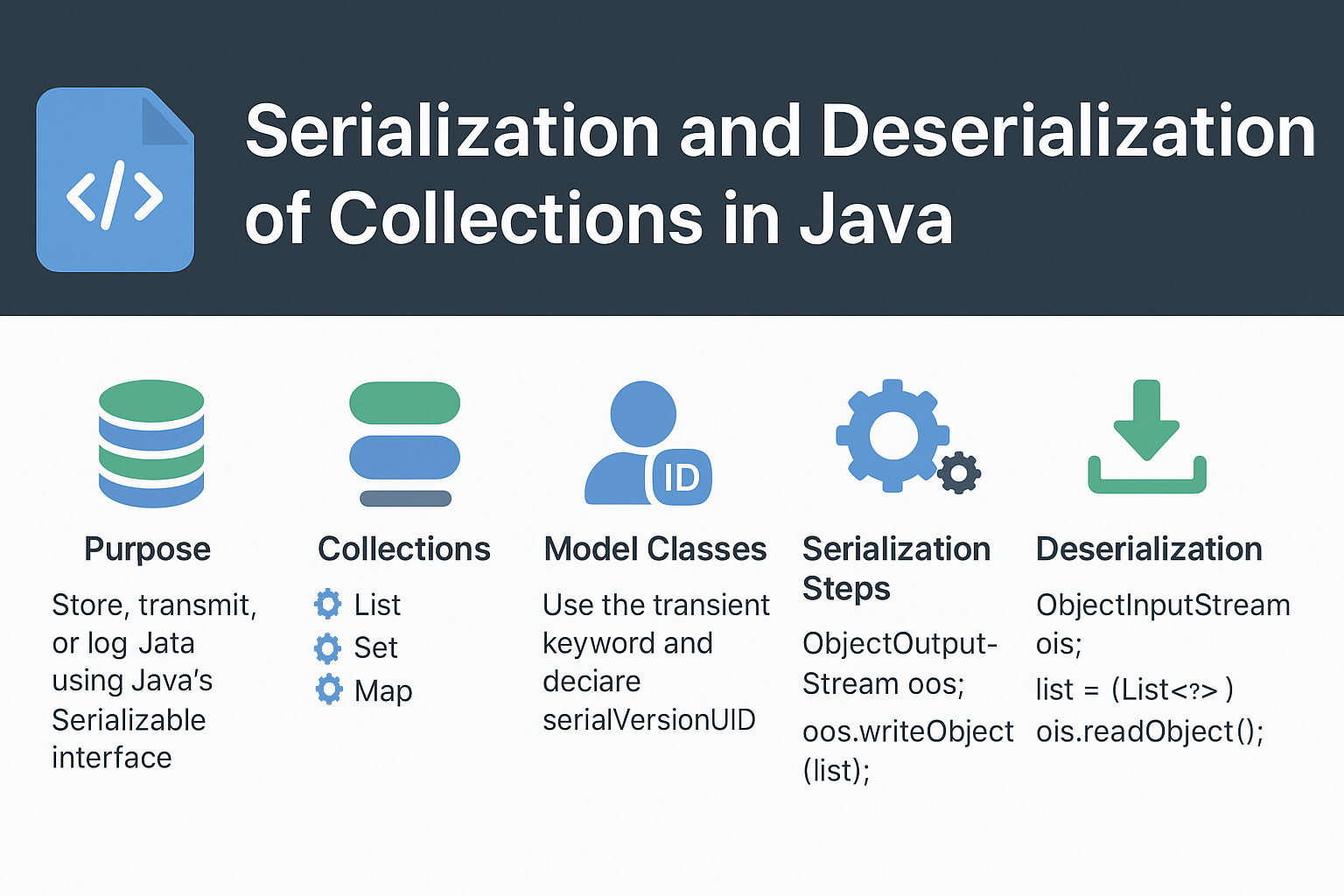Java 8 brought lambdas to the forefront, simplifying code, enabling functional-style programming, and improving productivity. But an often misunderstood and misused feature is the serialization of lambda expressions. While Java supports it under certain conditions, should you actually do it?
This comprehensive guide will walk you through the mechanics, use cases, risks, and best practices around serializing lambdas in Java. We’ll cover the “how,” “why,” and most importantly—the "should"—with examples, pitfalls, and safer alternatives.
🧠 What Is Lambda Serialization?
Serialization is the process of converting an object’s state into a byte stream, allowing it to be stored or transferred and later reconstructed.
Lambdas, although syntactically lightweight, are still objects. They can be serialized only if the target functional interface extends Serializable.
@FunctionalInterface
interface SerializableRunnable extends Runnable, Serializable {}
SerializableRunnable r = () -> System.out.println("Running");
🔍 How Does Java Serialize Lambdas?
Under the hood, Java does not serialize the actual lambda bytecode or closure context. Instead, it serializes a SerializedLambda object—a metadata snapshot that the JVM uses to reconstruct the lambda.
// Internally captures:
- Capturing class
- Method name and signature
- Functional interface info
- Captured arguments
This reconstruction mechanism makes lambda serialization fragile, as it depends heavily on implementation details that can change between JVM versions or even class refactors.
⚠️ Why It’s Problematic
1. Non-portability
Serialized lambdas are tightly coupled to:
- Capturing class structure
- Method name and bytecode
- JVM internals
A small change like renaming a method or recompiling can break deserialization.
2. Versioning Issues
If a serialized lambda was written with one version of a class and deserialized in another, incompatibility is likely.
3. Security Concerns
Serialized objects are potential vectors for attacks (e.g., deserialization vulnerabilities). Lambdas add more uncertainty due to reflection.
4. Obscured Intent
Debugging or tracing serialized lambdas is harder, especially when the underlying method references or closures are non-obvious.
✅ When Is It Acceptable?
- For short-term caching in memory (not persisted across versions)
- Internal frameworks where you control both serialization and deserialization
- Cases with well-documented and immutable class structures
But even then—explicit class implementations are safer.
🤔 Alternatives to Lambda Serialization
- Use named classes that implement
Serializable - Capture values using POJOs (Plain Old Java Objects)
- Serialize configuration data, not logic
- Use function registries or strategy patterns for behavior injection
🔄 Comparing: Lambdas vs Anonymous Classes
| Feature | Lambda Expression | Anonymous Class |
|---|---|---|
| Syntax | Concise | Verbose |
| Serialization | Risky, fragile | Safer (if declared serializable) |
| Class File Size | Smaller | Larger |
| Scope Handling | Must be effectively final | Can access this and shadow vars |
📦 Example: Serializable Lambda Pitfall
@FunctionalInterface
interface Task extends Serializable {
void run();
}
Task task = () -> System.out.println("Lambda running");
// Serialization
ObjectOutputStream out = new ObjectOutputStream(new FileOutputStream("lambda.ser"));
out.writeObject(task);
// Deserialization
ObjectInputStream in = new ObjectInputStream(new FileInputStream("lambda.ser"));
Task deserialized = (Task) in.readObject();
deserialized.run();
This will work — but only if the capturing class and method stay unchanged. Rename the method or class, and deserialization fails.
🔗 Lambdas and Functional Interfaces Recap
Lambda expressions in Java are designed to implement functional interfaces—those with a single abstract method. The standard library (java.util.function) includes:
Function<T, R>– transforms input to outputConsumer<T>– accepts a value, returns nothingSupplier<T>– supplies a valuePredicate<T>– returns a boolean
You can combine them with .andThen(), .compose(), or .negate() for advanced chaining.
📌 What's New in Java?
Java 8
- Introduced lambdas, streams,
java.util.function Serializablelambdas supported
Java 9
Optional.ifPresentOrElse, Flow API
Java 11
varin lambda parameters (e.g.,(var x) -> x + 1)
Java 17
- Sealed classes can be used to limit targets of lambdas
Java 21
- Virtual Threads – support async lambdas
- Scoped Values – better data handling across threads
🧱 Real-World Analogy
Imagine you’re shipping instructions to a remote factory. You send either:
- A recipe card (lambda) → Short and sweet, but dependent on your kitchen setup
- A chef-in-a-box (class) → Bulkier, but self-contained and more portable
Serialization sends the “recipe,” not the chef. If the recipient’s kitchen changes, the recipe may fail. Safer to send the chef!
✅ Conclusion and Key Takeaways
- Lambdas can be serialized, but doing so is fragile and discouraged.
- Prefer using serializable named classes or patterns over serialized lambdas.
- Avoid persisting serialized lambdas to disk or between application versions.
- Understand the JVM internals and version sensitivity before relying on lambda serialization.
❓ Expert FAQ
Q1: Can I serialize a lambda in Java?
Yes, only if the target interface extends Serializable.
Q2: Are lambdas serialized as bytecode or metadata?
Metadata — via SerializedLambda, not raw bytecode.
Q3: Is lambda serialization stable across JVM versions?
No. Changes in JVM, compiler, or class structure may break deserialization.
Q4: What's a safer alternative?
Use serializable named classes or strategy pattern implementations.
Q5: Can I deserialize a lambda created in another JVM?
Only if the class structure and method signatures are identical.
Q6: Are method references safer to serialize?
No. They also rely on the same SerializedLambda infrastructure.
Q7: Can I use lambdas for remote calls (RMI, RPC)?
Avoid it. Use standard serialization techniques for commands or data.
Q8: What happens if a captured variable changes after serialization?
It won’t matter—lambda captures by value, not reference.
Q9: Can I see the SerializedLambda object?
Yes, via reflection or debugging—but it's internal and should not be relied on.
Q10: Is it ever recommended to serialize lambdas?
Only in tightly controlled environments or temporary in-memory contexts—not in production or persisted systems.
